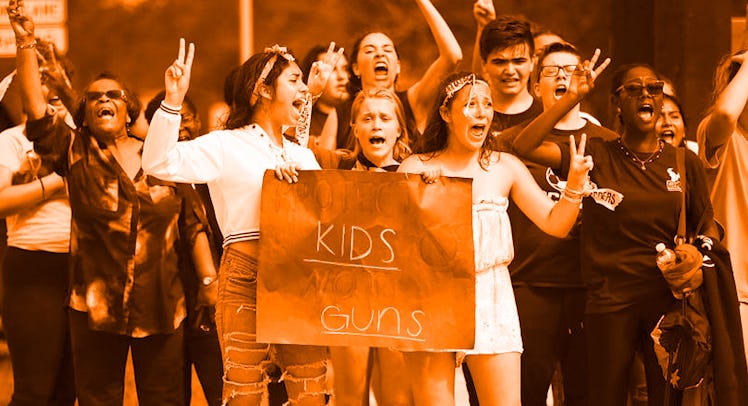Let Kids Protest Gun Laws and Let Them Be Suspended or Punished For It
Students are walking out to protest gun laws. Some face punishments and suspensions. So be it.

This past week, in the wake of the Parkland, Florida school shooting, students across the country announced that they plan to walk out of schools and rally in response to government inaction on gun control. While educators and members of law enforcement in many states will support and even facilitate the coming protests, some won’t. Students are already being threatened with punishments and repercussions should they choose to participate in protests. This puts parents in the position of either encouraging kids to stand down, encouraging kids to break rules and face consequences, or pushing back on the consequences. Fortunately, there is a clear way forward.
Parents should let their kids walk out and let their kids be punished. Parents should let kids exercise dissent and learn that, while the path to creating meaningful change is not easy, that doesn’t mean it is any less important. Ultimately, kids are going to learn about civil disobedience regardless. They’ll learn the same lesson if they protest in contradiction to their parents’ demands or concerns. Better to have a lesson plan.
In a Needville, outside of Houston, superintendent Curtis Rhodes told parents that all students who protest gun laws in the wake of Parkland will be suspended for three days. “We will discipline no matter if it is one, fifty, or five hundred students involved,” he wrote on the school’s Facebook page. Another administrator in a district in Wisconsin threatened the same after catching wind of a scheduled walk-out in mid-March. While it may be tempting for parents — particularly parents who agree with the kids — to argue against these measures, it may be best to just let it happen. Progress, after all, is not just an extracurricular.
The fact is that there has not been a meaningful protest in the past 100 years that did not end in some level of punishment or violence or disruption to daily life. Many people like to forget this fact. They like to forget that Civil Rights protests were deeply unpopular and heavily policed, that the labor protests in the 1920s were incredibly violent, and that the student protests over the Vietnam War led to convictions. Because those protest movements were ultimately successfully — at least to some degree — it’s tempting to revise history and to believe that the protesters were heard. That is simply not the case. Those that challenge the status quo are inevitably punished for doing so.
Threatening discipline against teenage protestors is not an unfamiliar refrain. Such tactics were used (occasionally non-verbally) to quell labor activism protests, to stop student protests against the Vietnam war and student dissident crackdowns in the 1960s, to halt walk-outs over DACA repeals and deportations. It is also historically unusually for teenagers and activists to ignore threats of arrests, suspensions, expulsions, or bodily harm in their pursuit of justice. It seems unlikely (though hardly impossible) that the looming student protests will turn violent so they actually represent an opportunity for kids to advocate for their own safety and encounter some risk without staring down the likelihood of profound harm.
Some America’s most successful activists have been students. Look at the Student Nonviolent Coordinating Committee, organized by Ella Baker, after the Greensboro sit-in. John Lewis, then a SNCC member and now a senator, missed school in order to March on Selma. Other young people missed school to join the SNCC’s Freedom Rides in 1961. Young people affiliated with SNCC led black voter registration drives. A lot of classes got cut, but American history was also altered.
That said, the SNCC comparison is a disingenuous one. SNCC activists took massive risks and did so despite very explicit threats of violence and acts of violence. Still, it’s important to recognize that it takes all kinds of actions and measures to make meaningful change. And it’s also important to understand how to exert pressure and punish the powerful.
After all, if Superintendent Rhodes really wants to make his subordinates process hundreds or thousands of suspensions and detention letters, and force his teachers to create a curriculum for students who are removed from school, he’s going to have to spend the time and resources to do exactly that. If Rhodes wants to tank his district’s attendance rates by having thousands of kids across the district absent from school for three days, he can do that.
Besides which, if kids demand the right to safety they might actually get some. That’s more important than any suspension of minor school punishment. And if school punishments are intended to be instructive — and they are supposed to be — maybe a suspension will teach a valuable lesson, both about history and about how power is often exercised in defense of an unacceptable status quo.